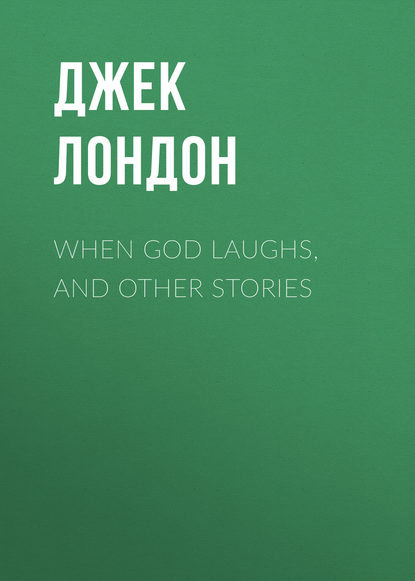По всем вопросам обращайтесь на: info@litportal.ru
(©) 2003-2024.
✖
When God Laughs, and Other Stories
Настройки чтения
Размер шрифта
Высота строк
Поля
“Well, to the logic. The man and the woman argued thus: Why kiss once only? If to kiss once were wise, was it not wiser to kiss not at all? Thus could they keep Love alive. Fasting, he would knock forever at their hearts.
“Perhaps it was out of their heredity that they achieved this unholy concept. The breed will out and sometimes most fantastically. Thus in them did cursed Albion array herself a scheming wanton, a bold, cold-calculating, and artful hussy. After all, I do not know. But this I know: it was out of their inordinate desire for joy that they forewent joy.
“As he said (I read it long afterward in one of his letters to her): ‘To hold you in my arms, close, and yet not close. To yearn for you, and never to have you, and so always to have you.’ And she: ‘For you to be always just beyond my reach. To be ever attaining you, and yet never attaining you, and for this to last forever, always fresh and new, and always with the first flush upon us.
“That is not the way they said it. On my lips their love-philosophy is mangled. And who am I to delve into their soul-stuff? I am a frog, on the dank edge of a great darkness, gazing goggle-eyed at the mystery and wonder of their flaming souls.
“And they were right, as far as they went. Everything is good… as long as it is unpossessed. Satiety and possession are Death’s horses; they run in span.
“‘And time could only tutor us to eke
Our rapture’s warmth with custom’s afterglow.’
“They got that from a sonnet of Alfred Austin’s. It was called ‘Love’s Wisdom.’ It was the one kiss of Madeline de Maupin. How did it run?
“‘Kiss we and part; no further can we go;
And better death than we from high to low
Should dwindle, or decline from strong to weak.’
“But they were wiser. They would not kiss and part. They would not kiss at all, and thus they planned to stay at Love’s topmost peak. They married. You were in England at the time. And never was there such a marriage. They kept their secret to themselves. I did not know, then. Their rapture’s warmth did not cool. Their love burned with increasing brightness. Never was there anything like it. The time passed, the months, the years, and ever the flame-winged lute-player grew more resplendent.
“Everybody marvelled. They became the wonderful lovers, and they were greatly envied. Sometimes women pitied her because she was childless; it is the form the envy of such creatures takes.
“And I did not know their secret. I pondered and I marvelled. As first I had expected, subconsciously I imagine, the passing of their love. Then I became aware that it was Time that passed and Love that remained. Then I became curious. What was their secret? What were the magic fetters with which they bound Love to them? How did they hold the graceless elf? What elixir of eternal love had they drunk together as had Tristram and Iseult of old time? And whose hand had brewed the fairy drink?
“As I say, I was curious, and I watched them. They were love-mad. They lived in an unending revel of Love. They made a pomp and ceremonial of it. They saturated themselves in the art and poetry of Love. No, they were not neurotics. They were sane and healthy, and they were artists. But they had accomplished the impossible. They had achieved deathless desire.
“And I? I saw much of them and their everlasting miracle of Love. I puzzled and wondered, and then one day – ”
Carquinez broke off abruptly and asked, “Have you ever read, ‘Love’s Waiting Time’?”
I shook my head.
“Page wrote it – Curtis Hidden Page, I think. Well, it was that bit of verse that gave me the clue. One day, in the window-seat near the big piano – you remember how she could play? She used to laugh, sometimes, and doubt whether it was for them I came, or for the music. She called me a ‘music-sot’ once, a ‘sound-debauchee.’ What a voice he had! When he sang I believed in immortality, my regard for the gods grew almost patronizing and I devised ways and means whereby I surely could outwit them and their tricks.
“It was a spectacle for God, that man and woman, years married, and singing love-songs with a freshness virginal as new-born Love himself, with a ripeness and wealth of ardour that young lovers can never know. Young lovers were pale and anaemic beside that long-married pair. To see them, all fire and flame and tenderness, at a trembling distance, lavishing caresses of eye and voice with every action, through every silence – their love driving them toward each other, and they withholding like fluttering moths, each to the other a candle-flame, and revolving each about the other in the mad gyrations of an amazing orbit-flight! It seemed, in obedience to some great law of physics, more potent than gravitation and more subtle, that they must corporeally melt each into each there before my very eyes. Small wonder they were called the wonderful lovers.
“I have wandered. Now to the clue. One day in the window-seat I found a book of verse. It opened of itself, betraying long habit, to ‘Love’s Waiting Time.’ The page was thumbed and limp with overhandling, and there I read: —
“‘So sweet it is to stand but just apart,
To know each other better, and to keep
The soft, delicious sense of two that touch…
O love, not yet!.. Sweet, let us keep our love
Wrapped round with sacred mystery awhile,
Waiting the secret of the coming years,
That come not yet, not yet… sometime…
not yet…
Oh, yet a little while our love may grow!
When it has blossomed it will haply die.
Feed it with lipless kisses, let it sleep,
Bedded in dead denial yet some while…
Oh, yet a little while, a little while.’
“I folded the book on my thumb and sat there silent and without moving for a long time. I was stunned by the clearness of vision the verse had imparted to me. It was illumination. It was like a bolt of God’s lightning in the Pit. They would keep Love, the fickle sprite, the forerunner of young life – young life that is imperative to be born!
“I conned the lines over in my mind – ‘Not yet, sometime’ – ‘O Love, not yet’ – ‘Feed it with lipless kisses, let it sleep.’ And I laughed aloud, ha, ha! I saw with white vision their blameless souls. They were children. They did not understand. They played with Nature’s fire and bedded with a naked sword. They laughed at the gods. They would stop the cosmic sap. They had invented a system, and brought it to the gaming-table of life, and expected to win out. ‘Beware!’ I cried. ‘The gods are behind the table. They make new rules for every system that is devised. You have no chance to win.’
“But I did not so cry to them. I waited. They would learn that their system was worthless and throw it away. They would be content with whatever happiness the gods gave them and not strive to wrest more away.
“I watched. I said nothing. The months continued to come and go, and still the famine-edge of their love grew the sharper. Never did they dull it with a permitted love-clasp. They ground and whetted it on self-denial, and sharper and sharper it grew. This went on until even I doubted. Did the gods sleep? I wondered. Or were they dead? I laughed to myself. The man and the woman had made a miracle. They had outwitted God. They had shamed the flesh, and blackened the face of the good Earth Mother. They had played with her fire and not been burned. They were immune. They were themselves gods, knowing good from evil and tasting not. ‘Was this the way gods came to be?’ I asked myself. ‘I am a frog,’ I said. ‘But for my mud-lidded eyes I should have been blinded by the brightness of this wonder I have witnessed. I have puffed myself up with my wisdom and passed judgment upon gods.’
“Yet even in this, my latest wisdom, I was wrong. They were not gods. They were man and woman – soft clay that sighed and thrilled, shot through with desire, thumbed with strange weaknesses which the gods have not.”
Carquinez broke from his narrative to roll another cigarette and to laugh harshly. It was not a pretty laugh; it was like the mockery of a devil, and it rose over and rode the roar of the storm that came muffled to our ears from the crashing outside world.
“I am a frog,” he said apologetically. “How were they to understand? They were artists, not biologists. They knew the clay of the studio, but they did not know the clay of which they themselves were made. But this I will say – they played high. Never was there such a game before, and I doubt me if there will ever be such a game again.
“Never was lovers’ ecstasy like theirs. They had not killed Love with kisses. They had quickened him with denial. And by denial they drove him on till he was all aburst with desire. And the flame-winged lute-player fanned them with his warm wings till they were all but swooning. It was the very delirium of Love, and it continued undiminished and increasing through the weeks and months.
“They longed and yearned, with all the fond pangs and sweet delicious agonies, with an intensity never felt by lovers before nor since.
“And then one day the drowsy gods ceased nodding. They aroused and looked at the man and woman who had made a mock of them. And the man and woman looked into each other’s eyes one morning and knew that something was gone. It was the flame-winged one. He had fled, silently, in the night, from their anchorites’ board.
“They looked into each other’s eyes and knew that they did not care. Desire was dead. Do you understand? Desire was dead. And they had never kissed. Not once had they kissed. Love was gone. They would never yearn and burn again. For them there was nothing left – no more tremblings and flutterings and delicious anguishes, no more throbbing and pulsing, and sighing and song. Desire was dead. It had died in the night, on a couch cold and unattended; nor had they witnessed its passing. They learned it for the first time in each other’s eyes.
“The gods may not be kind, but they are often merciful. They had twirled the little ivory ball and swept the stakes from the table. All that remained was the man and woman gazing into each other’s cold eyes. And then he died. That was the mercy. Within the week Marvin Fiske was dead – you remember the accident. And in her diary, written at this time, I long afterward read Mitchell Kennerly’s: —
“‘There was not a single hour
We might have kissed and did not kiss.’”
“Oh, the irony of it!” I cried out.
And Carquinez, in the firelight a veritable Mephistopheles in velvet jacket, fixed me with his black eyes.
“And they won, you said? The world’s judgment! I have told you, and I know. They won as you are winning, here in your hills.”
“But you,” I demanded hotly; “you with your orgies of sound and sense, with your mad cities and madder frolics – bethink you that you win?”
He shook his head slowly. “Because you with your sober bucolic regime, lose, is no reason that I should win. We never win. Sometimes we think we win. That is a little pleasantry of the gods.”
THE APOSTATE
“Now I wake me up to work;
I pray the Lord I may not shirk.
If I should die before the night,
I pray the Lord my work’s all right.
Amen.”

















